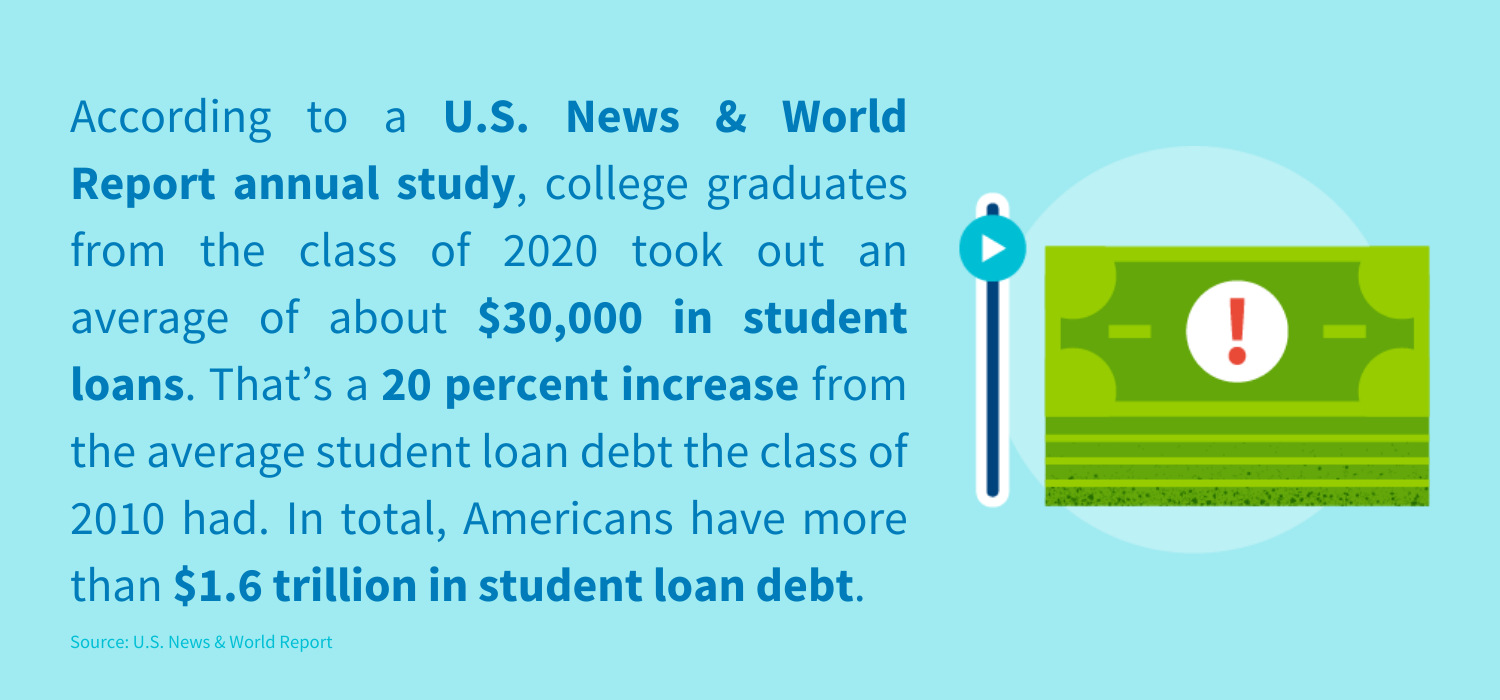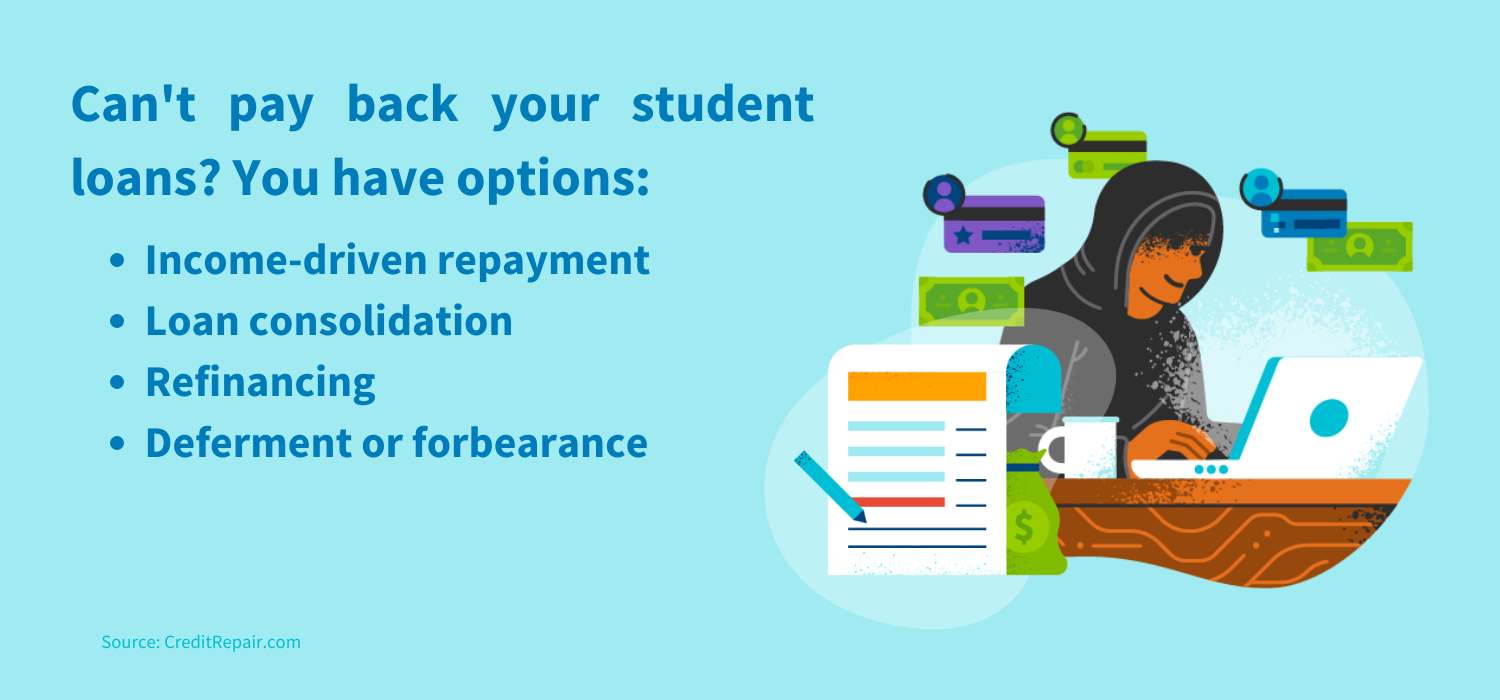
Disclosure regarding our editorial content standards.
According to a U.S. News & World Report annual study, college graduates from the class of 2020 took out an average of about $30,000 in student loans. That’s a 20 percent increase from the average student loan debt the class of 2010 had. In total, Americans have more than $1.6 trillion in student loan debt. As more students graduate with five-figure debt, many become overwhelmed with what their outstanding debt now means for them.
Naturally, most people with student loan debt start to wonder about questions like “When do student loans show up on a credit report, and how do they appear?”
The short answers are student loan debt appears on credit reports as a type of installment loan, and many students are surprised to realize that student loans show up shortly after opening their accounts. However, it’s not until your loans are in repayment that you’ll see a significant potential impact on your credit.
Keep reading for a complete breakdown of how student loans can impact your credit.
What are student loans?
Going to college is incredibly expensive. And unless students have family members who can afford the fees, most young college students find themselves turning to loans to pay for their schooling costs.
Student loans allow individuals to borrow money from a lender and pay for expenses associated with their schooling, such as tuition, books and other school supplies and living expenses. The idea is that when the student graduates and uses their degree to find a full-time job, they can begin to pay back the loans to their lender plus interest and applicable fees.
There are two types of student loans in the United States: federal and private. Federal student loans are issued through the government, while private student loans are issued through private lenders. The type of student loan you have can dictate when they need to be repaid, the kind of repayment plan options and more.

How do student loans appear on your credit report?
Student loans appear on your credit report as a type of installment loan. An installment loan, like a mortgage or car loan, is where the debt is repaid in equal payments over a predetermined time. This is different than revolving credit, like credit cards, where the payment details can change every month depending on your usage.
Additionally, while consumer credit card debt is considered “bad” due to fluctuating interest rates, compounding balances and risk potential, student loans are classified as “good debt” for a few reasons:
When are student loans reported to the credit bureaus?
Student loans typically appear on a credit report just a little while after the account is opened. But while the loan may appear on your account, it will be listed as “deferred” until the repayment period begins. For most students, repayment doesn’t start until six to 12 months after graduation. However, that’s not always the case, and it’s essential to understand the terms of your student loan contract. For instance, some private lenders expect repayment while the borrower is still in school.
Do multiple student loans appear as a single debt?
Regardless of whether you use the same lender, every instance of borrowing will show up as an individual account. For example, let’s say you borrowed $7,000 one year and $12,000 the following year from the same lender. Even though you technically have one loan with them and you’ll have one payment when it comes time for repayment, the amounts will show up as separate accounts on your credit report.
When do student loans have a negative impact on my credit report?
Student loans act like any other form of credit. If you handle them responsibly, they’ll positively impact your credit. But if you fail to make your payments, your student loans can negatively impact your credit.
Here are a few ways your student loans can negatively impact your credit:
What if you can’t pay back your student loans?
No one wants to be in a situation where they can’t pay back their student loans, but it does happen. Maybe you couldn’t get a high-paying job or you’ve had other emergency expenses come up. The good news is options are available if you’re in this situation.

Income-driven repayment
If you have a federal student loan, you can opt for an income-driven repayment plan. This type of repayment plan considers the income you’re making and adjusts your monthly payment so you can afford both the payment and everyday living expenses. As your income increases, your monthly payment plan adjusts to match.
Loan consolidation
If you have multiple student loans or a combination of student loans and other types of debt, you may want to consider loan consolidation. Loan consolidation is the process of taking out one large loan with a new lender and paying off all your existing lenders. As a result, you get to deal with only one monthly payment and one interest rate, making debt repayment planning much more manageable.
When going down the route of loan consolidation, make sure to agree to a new loan amount that fits your budget. One option is to extend the loan term to lower your monthly payment.
Refinancing
If you can’t afford your student loan payment, another option to consider is refinancing. When you refinance, you may be able to negotiate a lower interest rate and a longer loan term. This will lower your monthly payment to an amount you can reasonably afford.
Note that only private lenders offer refinancing, so if you have a federal student loan, you’ll have to make the switch.
Deferment or forbearance
Some individuals qualify for a loan deferment or forbearance, both of which temporarily halt your student loan payments. No interest will accrue on your student loans while you’re paused with a deferment. However, with forbearance, interest will continue to accrue.
Deferment and forbearance don’t affect your credit because they’re granted by the lender and the loan is considered paid as agreed.
What happens if your loans are sold to another company?
It’s quite common for lenders to sell debts, including student loan debts, to each other. A lender is legally required to notify you when this happens. Technically, this sale shouldn’t have an impact on your loan or your credit.
Company A will sell to Company B and your loan will simply exchange hands. However, it’s recommended you keep your records on hand for a few months during this sale to make sure the correct loan amount is transferred over.
Will student loan debt affect your ability to gain new credit?
Student loan debt is considered good debt, but it’s still seen as an outstanding debt you have to pay off. So, having a student loan on your credit report can impact your debt-to-income (DTI) ratio. Your DTI ratio is how much you owe versus how much you make. Having a high DTI affects your ability to take out new credit (such as mortgages, credit cards, auto loans and private loans).
For example, most mortgage lenders won’t approve an application with a DTI ratio above 35 percent. So if your student loan bumps you above that threshold, you may not be able to secure a mortgage until you either increase your income or pay down your student loan balance.
Are student loans right for you?
Student loans are often an excellent way to progress towards the career you want. Rather than saving up for years and delaying school, most people see the benefit of taking out these loans to make headway on their education and pay the loans back while working.
Of course, student loans are like other types of credit and should be handled wisely. Before taking out a student loan, make sure you understand the terms of your agreement and have a plan for repayment. And remember—you don’t have to take out student loans for all your college expenses. Applying for grants and scholarships, as well as working part-time if you can, can significantly reduce your reliance on student loans.
Note: The information provided on CreditRepair.com does not, and is not intended to, act as legal, financial or credit advice; instead, it is for general informational purposes only.
Questions about credit repair?
Chat with an expert: 1-800-255-0263






